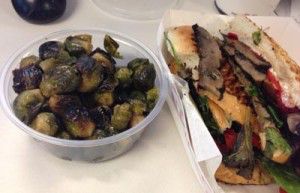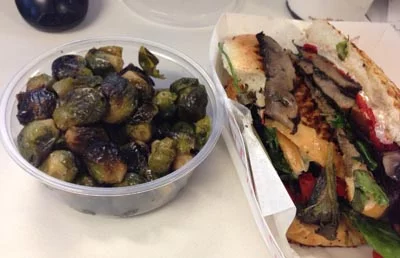
… speaking of great Coursera offerings, I just finished Katie Ferraro’s excellent Nutrition for Health Promotion and Disease Prevention course. Its focus on evidence-based medicine was refreshing and helped clear up a lot of confusion I’ve had from contradictory sources over the years. Since Coursera content is prone to being archived, I wanted to preserve the extensive set of external references provided so I can consult them later. The hard work of identifying and assembling this into a logical grouping all of this was Katie’s. I’ve tried to clean up the list, expand abbreviations, and add my own commentary. Thus, if there are mistakes, they’re mine.
—-
Week 1: Introduction to Nutrition Science
Why Study Nutrition?
- World Health Organization (WHO) E-Library of Evidence for Nutrition Actions (eLENA) A-Z list of interventions
- WHO eLENA overview, Choosing Good Nutrition Video
- Academy of Nutrition & Dietetics (AND) Evidence Analysis Library
- AND NutriGuides mobile app [This is intended for practitioners.]
- United States Department of Agriculture (USDA) Nutrition Evidence Library (NEL)
- United States Department of Health & Human Services (DHHS) National Guideline Clearinghouse
Carbohydrates: MedlinePlus, Center for Disease Control (CDC) Nutrition for Everyone: Carbohydrates, Food and Agriculture Organization of the United Nations (FAO) Carbohydrates in human nutrition, University of California at San Francisco (UCSF) Patient Education, Carbohydrates
Lipids (aka “fats.”): MedlinePlus, CDC Nutrition for Everyoen: Dietary Fat, FAO Fats and oils in human nutrition, UCSF Patient Education, Fat, Fats Domino (I was just seeing if anyone was paying attention.)
Protein: MedlinePlus, CDC Nutrition for Everyone: Protein, FAO Energy and Protein Requirements, UCSF Patient Education Healthy Ways to Increase Calories & Protein
Vitamins: Medline Plus, Harvard School of Public Health (HSPH) Vitamins, FAO Human Vitamin and Mineral Requirements, WHO Vitamin A Deficiency
Minerals: Medline Plus, Harvard Health Vitamins & Minerals: Understanding Their Role, FAO Human Vitamin & Mineral Requirements, US National Institutes of Health (NIH) Office of Dietary Supplements (ODS) Calcium
Meal Planning Guides

- ChooseMyPlate.gov — This is a USDA revision that’s more intuitive than the Food Pyramid. They also have a diet tracker, SuperTracker Class consensus (which includes a lot of international participants) was the foodstuff database is very incomplete. I would recommend MyFitnessPal. FatSecret‘s nutritional database was also pretty useful.
- American Diabetes Association (ADA), Planning Meals, MyFoodAdvisor
- Nutrihand, Consumer Meal Planning
- HSPH, Healthy Eating Plate
- Oldways – a set of programs for “health through heritage”
- NIH, Health Menu Planner
- Interactive [Daily Reference Intake] for Healthcare Professionals
Dietary Supplements
- FAO, Nutritional Requirements
- Office of Dietary Supplements (ODS), Dietary Supplement Fact Sheets
- University of California at Berkeley (UCB), Berkeley Wellness Letter Dietary Supplements Guide
- MedlinePlus, Herbal Medicine
- NIH, National Center for Complementary and Alternative Medicine (NCCAM), Using Dietary Supplements Wisely
Week 2: Heart Disease
Therapeutic Lifestyle Change (TLC) [This advocates diet, physical activity and weight management as a first step.]
- NIH, Your Guide to Lowering Your Cholesterol with TLC, Senior Health TLC for High Blood Cholesterol
- NIH National Heart Lung and Blood Institute (NHLBI), Therapeutic Lifestyle Changes Diet (This wasn’t quite working when I tried it.)
- UCSF Patient Education – Guidelines for Low Cholesterol, Low Saturated Fat Diet
Dietary Fat and Heart Disease
- American Heart Association (AHA), Fats 101, My Fat Translator (Given your age, height, weight and physical activity, it shows your BMI and recommended calorie intake with some suggested substitutions. I found its target calories to be on the high side.)
- WHO Global atlas on cardiovascular disease prevention and control
- HSPH, Fats and Cholesterol: Out with the Bad… (Claire’s not going to like the recommendation of eating walnuts…)
Essential Fatty Acids [Fatty acids you need but your body cannot synthesize on its own. There is an older study on PubMed asserting that the ratio of Omega 6 to Omega 3 fatty acids is out of whack. I’ve seen some viral youtube videos suggesting the ratio can lead to “inflammation” of the arteries, suggesting eventual problems. I see more reputable sources saying “there is no evidence” than I see evidence.]
- HSPS, Omega-3 Fatty Acids
- NCCAM, Omega‐3 Supplements
Office of Dietary Supplements, Omega-3 Fatty Acids Working Group Report[This report is “deprecated”]
Dietary Fiber and Heart Disease
- HSPH, Fiber: Start Roughing It! (Spoiler alert: eat more.)
- American Heart Association, Whole Grains and Fiber
- MedlinePlus – Dietary Fiber
The Mediterranean Diet and Heart Health [Its focus is reducing cardiovascular risk factors through a diet low in saturated fats and cholesterols. It is not low-fat, but considers type of fat. A recent review in the New England Journal of Medicine suggests there is credibility.]
- University of Minnesota The Seven Countries Study in Brief
- Oldways, What is the Mediterranean Diet?
- American Heart Association Mediterranean Diet
The DASH Diet [Its focus is reducing hypertension through decreased fat, salt and cholesterol intake while trying to increase potassium. Not surprisingly, most of the salt comes from my favorite foods: breads, pizza, cheese, pasta, potato chips, pretzels, and bacon.]
- NHLBI What is the DASH Eating Plan?
- Your Guide to Lowering Your Blood Pressure with DASH (brief), (long)
- UCSF Patient Education – Guidelines for a Low Sodium Diet
Dietary Management of Hypertriglyceridemia: American Heart Association, MedlinePlus
Plant Stanols and Sterols [These are used to reduce cholesterol; They’re pretty expensive and only effective with a decent diet. In other words, you’re still going to have to cut back on the bacon and egg lardshakes.] — Cleveland Clinic, University of Southern California, Keck Medical Center

- Harvard Health Letter Spreading your way to lower cholesterol?
Week 3: Diabetes
Defining and Diagnosing Diabetes
- American Diabetes Association, Standards of Medical Care in Diabetes 2012
- MedlinePlus – Diabetes, Diabetes Interactive Tutorial
- International Diabetes Federation
Physical Activity and Weight in Diabetes
- NIH, Diabetes Prevention Program
- CDC – Prevent Diabetes
- WHO – The Cost of Diabetes
- National Diabetes Information Clearinghouse – What I need to know about Physical Activity and Diabetes
Meal Planning for Diabetes
- MedlinePlus, Diabetes – When you are Sick, Diabetes and Meal Planning, Hypoglycemia
- American Diabetes Association – Planning Meals, MyFoodAdvisor
- USDA Nutrient Database
Carbohydrate Counting and Exchange Lists For Meal Planning
- American Diabetes Association – Carbohydrate Counting
- Clinical Diabetes – Carb Counting, the Basics
- Mayo Clinic, Full Exchange lists (2008)
- USDA Carbohydrate Counting and Exchange Lists
Dietary Fiber and Blood Sugar Control
- WebMD “Fiber-o-Meter” Dietary Fiber Calculator
Non-Nutritive Sweeteners
- MedlinePlus Sweeteners – sugars
- Nutrition and Food Web Archive ADI Calculator
Gestational Diabetes: PubMed Health, American Diabetes Association, UCSF Patient Education – Diabetes in Pregnancy
Week 4: Cancer
Cancer Prevention
- World Cancer Research Fund (WCRF) and American Institute for Cancer Research (ACRI), Second Expert Report Recommendations
- American Cancer Society (ACS) Prevention Guidelines
Diet and Cancer
- American Institute for Cancer Research (AICR) Quiz: How Healthy is Your Diet? [Oh, if I lived in a lower latitude where fruits were more readily available…]
- ACS Calculators
- HSPH Fiber and Colon Cancer: Following the Scientific Trail
- Ornish Spectrum – Prostate Cancer
- National Cancer Institute – Prostate Cancer, Nutrition & Supplements
- American Cancer Society: Bottom Line on Soy & Breast Cancer Risk
- WCRF Alcohol Calorie Calculator. [Yes, excess alcohol can increase your risk of cancer and awkward hook-up]
Debunking Cancer and Diet Myths [Executive summary: eat sensibly. There’s no silver bullet, but there’s a big pile of bullshit out there.]
- NCI Thinking About Complementary and Alternative Medicine: A Guide for People with Cancer
- AICR Foods that Fight Cancer
- AICR Foods that Fight Cancer Glossary
Nutrition Needs in Cancer
- MedlinePlus – Diet and Cancer Treatment
- American Cancer Society “I Can Cope” online nutrition class
Week 5: Obesity and Weight Management
Defining Obesity: World Health Organization, HSPH Measuring Obesity
Energy Balance: NIH/NHLBI, National Cancer Institute
Metabolic Syndrome [These are risk factors that, when occur together, imply a significantly higher risk of cardiovascular problems.]: Medline Plus, PubMed Health
Pediatric Obesity [Children who are obese are more likely to be obese adults.]
- HSPH, Healthy Weight Checklist, Child Obesity
- CDC, Ways to Enhance Children’s Activity and Nutrition (WeCAN)
- CDC, Child & Teen BMI Calculator
- Academy of Nutrition & Dietetics Family Nutrition & Physical Activity Survey
- ChooseMyPlate.gov – Children Over 5
Guest Lecturers [These were the two folks I remember as they offered different viewpoints.]
- Robert Lustig: Sugar – The Bitter Truth [This was interesting; I now understand the concerns about high-fructose corn syrup in diets.]
- Linda Bacon, PhD: Health at Every Size: The Surprising Truth about Your Weight, HAES Community Resources. [The premise is that weight loss is irrelevant if one is healthy. More here.]
- Association for Size Diversity and Health
- Nutrition Journal, Weight Science: Evaluating the Evidence for a Paradigm Shift
Week 6: Disorders of the GI Tract
Nutrient Digestion and Absorption: National Digestive Diseases Information Clearinghouse – Your Digestive System and How it Works
FODMAPS [fermentable oligo-, di-, and monosaccharides and polyols — groups of foods containing short-chained carbohydrates that cause problems] Approach to IBS [Irritable Bowel Syndrome] Management: Today’s Dietition – Successful Low-FODMAP Living, Shepherd Works – Low FODMAPs Diet
Celiac Disease [Your immune system gets drunk on gluten, goes medieval on your small intestine.]
- Medline Plus, Celiac Disease
- Today’s Dietitian, Evidence-Based Practice Guidelines
Diets for Diverticular Disease [This sounds awful.]: UCSF Patient Education – Diverticular Disease Diet, NDDIC – Diverticulosis and Diverticulitis
Other:
- World Health Organization, Diarrhea
- MedlinePlus – Diet, Constipation
- NDDIC Intestinal Gas
- MedlinePlus – GERD (Gastroesophageal reflux disease – food leaks back up. Among other problems, this can cause your teeth to weaken.)
- Nobel Prize, H. pylori [The cause of peptic ulcers is bacteria]
Food Allergies [Key learn: allergy == can kill you; sensitivity == makes you feel bad, but doesn’t kill you] The Food Allergy and Anaphylaxis Network, National Institute of Allergy and Infectious Diseases, Food Allergy
Dysphagia
- American Speech Language Hearing Association: Dysphagia
- MedlinePlus: Swallowing Disorders
- National Institute on Deafness and Other Communication Disorders
Probiotics and Prebiotics
- NCCAM – Oral Probiotics, an Introduction

> Since Coursera content is prone to being archived,
Ah, you mean “archived” in the sense of “moved to offline storage”, rather than “made permanently available for ever more”.
Of course now *you* have to keep the list of external references updated 🙂
If a course is reoffered, or sometimes Just Because, they’ll take the old course offline.
I betcha at least 20% of these links won’t work by the end of the year.